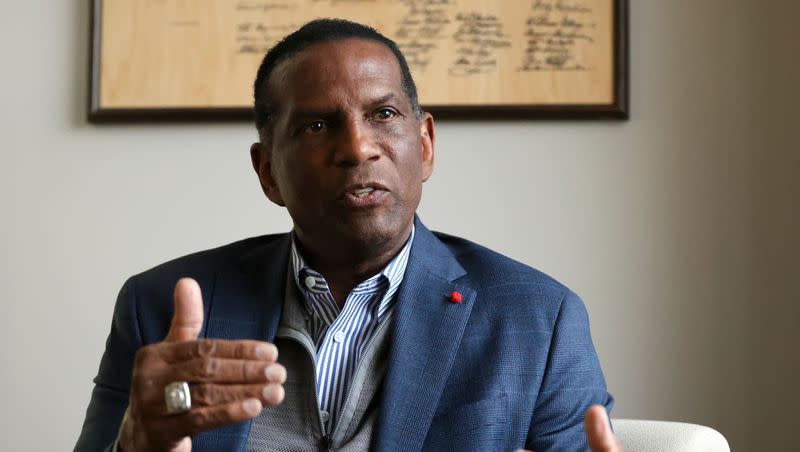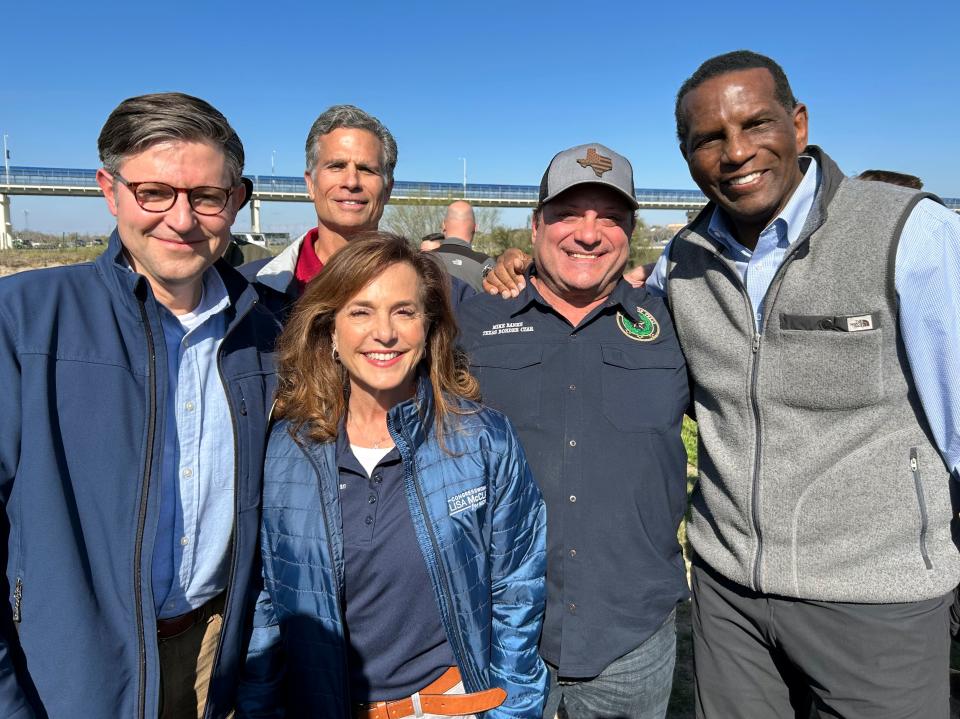Rep. Burgess Owens calls border security ‘most important’ part of budget talks, as border crossings reach record high

- Oops!Something went wrong.Please try again later.
- Oops!Something went wrong.Please try again later.
- Oops!Something went wrong.Please try again later.
Rep. Burgess Owens said when Congress returns next week, no issue should take precedence over stemming the flow of illegal immigration into the country.
Owens, who represents Utah’s 4th Congressional District, joined over 60 of his colleagues, including Utah’s 2nd District Rep. Celeste Maloy, in touring the southwest border this week. The visit, led by House Speaker Mike Johnson, R-La., was purportedly the largest congressional delegation ever to do so.
As the House returns from its holiday recess next Tuesday, amid another round of stalled budget talks before funding deadlines in mid-January and early February, Owens said advancing the House Republicans’ border security agenda will be integral to every part of the negotiations.
“It’s probably the most important conversation we’re going to have as a country right now,” Burgess told the Deseret News in an interview at his district office on Friday.
The last few years have seen migrant encounters with U.S. Customs and Border Protection along the U.S.-Mexico border skyrocket to levels never seen in American history.
December saw the greatest number of border encounters ever recorded, with the total exceeding 300,000 migrants to be apprehended and processed by Border Patrol agents in a single month, according to multiple media reports — surpassing September’s high of 270,000.
These totals come after fiscal year 2022 and 2023 recorded the greatest surge in border crossings since the country began keeping track.
Owens said these levels are unsustainable for Border Patrol agents, who have seen an increase in resignations and suicides in recent years, as well as for border communities and national infrastructure.

“We’re seeing chaos throughout our country. We’re seeing overwhelming of the system,” Owens said, making specific mention of the strain being placed on hospitals and welfare programs in locations with high levels of immigration.
Poorly designed or enforced border policy has also contributed to the influx of the cheap and deadly fentanyl into the U.S., Owens said. The synthetic opioid is one of the main drivers of the soaring rate of overdose deaths in the country, which now typically surpass 100,000 every year.
In an interview with the Deseret News on Thursday, Maloy said her visit to the border confirmed everything she had heard about the migrant crisis.
“We talk a lot about people coming across the border and how we don’t know who or how many. We talk about fentanyl coming across the border. We talk about all these bad things that are coming across the border, and all of that’s valid,” she said. “And we need to have control over our border because of all of those reasons.”
House Republicans are gearing up to make border security a central component of any annual spending bill for the 2024 budget — which is now more than three months past due — or any bill negotiated between the Senate and the White House that contains supplemental foreign aid for Ukraine and Israel, according to Punchbowl News.
At the center of these negotiations is a GOP proposal passed by the House last year called HR2, which would restrict the number of migrants entering the country with asylum claims, mandate the continued construction of a border wall, require U.S. employers to screen workers for legal documentation, and allocate more funds for Border Patrol agents.
The bill passed along party lines and is unlikely to gain any traction in the Democratic-led Senate, even when paired with Ukraine or government funding. While the White House did include some funding for border processing in a foreign aid package proposed in October, Democrats have failed to come to the table with a substantive alternative to HR2 that would address the wave of illegal immigration, according to Owens and Maloy.
“Right now the House has a plan. The Senate doesn’t have a plan. If the Senate had a plan, then we could be talking about whether to compromise between those two plans. But right now HR2 is the only border bill,” Maloy said. “So before we even start talking about what in HR2 is good and what in HR2 should be compromised on, someone’s got to show up at the table to compromise.”
Some House lawmakers in the conservative House Freedom Caucus have gone as far as saying that government funding should be allowed to expire in the first part of 2024 unless HR2 is passed — a proposition echoed by Utah Sen. Mike Lee.
“I will not vote to fund the government until our border is secure,” Lee said on Tuesday.
Owens called HR2 “the smartest, most strategic, strongest border security bill that we’ve put through” and said it would disincentivize individuals from making the perilous journey to the United States’ southern border because the chances of entering and being released into the country would be greatly diminished.
“We should not be looking at any other thing in terms of funding any other thing if we can’t take care of our own country,” Owens said.
While a bipartisan working group in the Senate has labored intensively for weeks over a border proposal that both chambers can tie to foreign aid, Owens said Democrats, following the lead of President Joe Biden, have shown an unwillingness to try and decrease the number of border crossings.
“The administration wants money just to process more people. That’s the difference. We want money to control the border, stop the flow, to protect the American people,” Owens said.
The disconnect between parties on what Owens says is a unifying issue for most Americans comes down to the prioritization of political ideology over national security realities.
“Anyone who decides, when seeing what’s happening at the border, ‘We do not want to close the border down,’ ... then they care more about their political party than they care about our country,” Owens said.
Upon entering office, Biden rescinded controversial Trump-era border policies, such as “Remain in Mexico,” which required migrants seeking asylum to await processing and court dates on the other side of the border. He and his cabinet, including Secretary of Homeland Security Alejandro Mayorkas, have been routinely criticized by Republicans, including Utah Sen. Mitt Romney, for what conservative lawmakers see as a refusal to adequately enforce border laws.
House Republicans will begin holding impeachment proceedings against Mayorkas next week, Punchbowl News has reported.
Owens suggested Biden is equally responsible for the crisis at the border, calling his lack of action a “derelict of his duty.”
“If we care about our children, our future, our country, we should all be one on this one,” Owens said.

